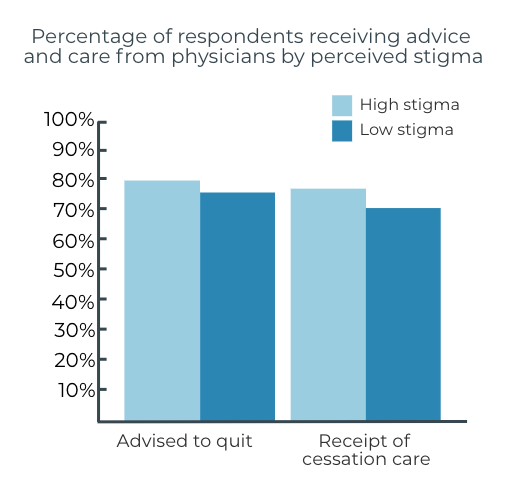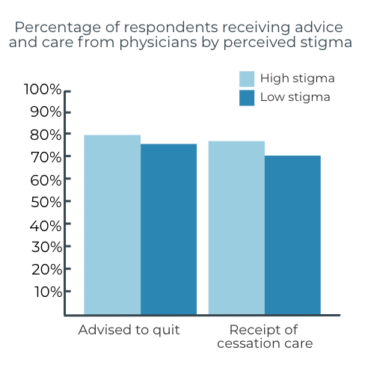Increasingly, socioeconomically disadvantaged people live within “smoking islands,” where it’s still socially acceptable to smoke. While they might experience less stigma about their smoking than higher socioeconomic status (SES) smokers, they might also receive less support from their physicians when it comes to smoking cessation. Physicians tend to lack motivation to discuss smoking cessation with lower SES patients. This week, as part of our Special Series on Stigma and Addiction, ASHES reviews a study by Patrick Hammett and colleagues that explored how smoking-related stigma and socioeconomic status relate to quitting support from healthcare providers.
What is the research question?
Are smoking behaviors related to feeling stigmatized about smoking? Do perceptions of smoking-related stigma relate to socioeconomic status (i.e., education and income) and quitting advice and care from healthcare providers?
What did the researchers do?
The researchers recruited 2,320 adults enrolled in Minnesota Health Care Programs to complete a study evaluating the effects of a smoking cessation program.1 Participants responded to questions about socioeconomic status, mental health, history of receiving advice to quit and receiving care for quitting from a healthcare provider, and perceptions of smoking-related stigma2 (e.g., “I have been treated as less intelligent by others because I smoke”). The researchers used t-tests and chi-square tests to assess demographics and experiences associated with low and high perceived stigma.
What did they find?
As predicted, the low smoking-related stigma group were of lower SES. Though they reported better mental health, perhaps because they experienced less stigma about their smoking, they were significantly less likely to report receiving physician advice to quit and to receive care for quitting (see figure).

Figure. Groups significantly differed on both advice to quit and receipt of cessation care. Click image to enlarge.
Why do these findings matter?
Stigma tends to have harmful effects on mental health. In this study, even though low smoking-related stigma was associated with better mental health, the patients who did not feel stigmatized about their smoking got less support from their physicians to quit. This could have obvious long-term consequences. Low SES patients might benefit from targeted interventions that reduce barriers to smoking cessation.
Every study has limitations. What were the limitations in this study?
The researchers did not ask participants how often they visited with healthcare providers. It could be that participants from disadvantaged socioeconomic backgrounds report different experiences because of limited access to health insurance compared to those from advantaged socioeconomic backgrounds. The results of this study might not apply broadly to other groups because 80% of the participants in this study were female.
For more information:
SmokeFree offers tools and tips for quitting and maintaining abstinence from smoking tobacco. For additional tools, please visit the BASIS Addiction Resources page.
— Pat Williams
What do you think? Please use the comment link below to provide feedback on this article.
________________
1 Readers can consult the original study for the results of this evaluation. Briefly, low smoking-stigma participants benefited more from a proactive smoking cessation program, designed to reduce barriers to physician support, than high smoking-stigma participants.
2 The researchers categorized participants as experiencing either low or high smoking-related stigma by adding the number of questions participants responded yes to about smoking-related stigma. Participants responding “yes” to two or less questions about stigma were categorized as experiencing low stigma. Participants responding “yes” to greater than three questions were categorized as experiencing high smoking-related stigma.




